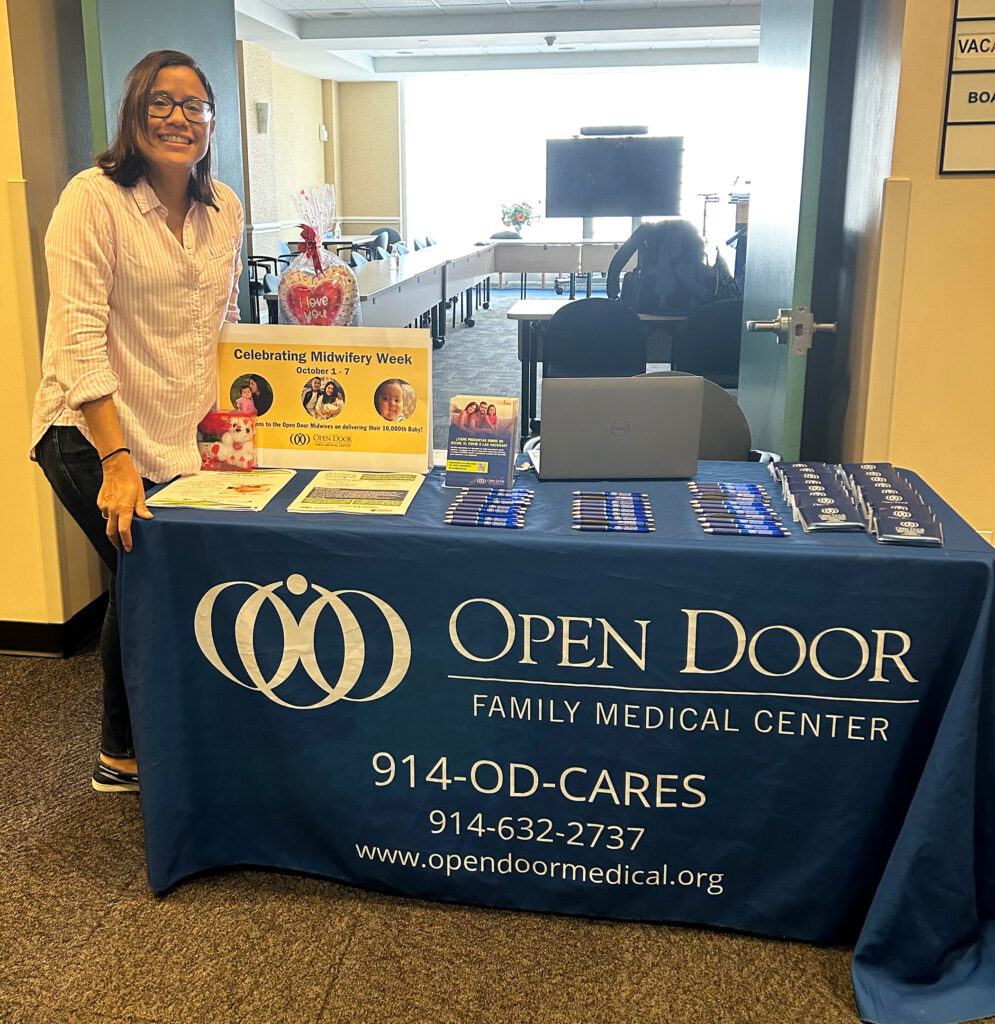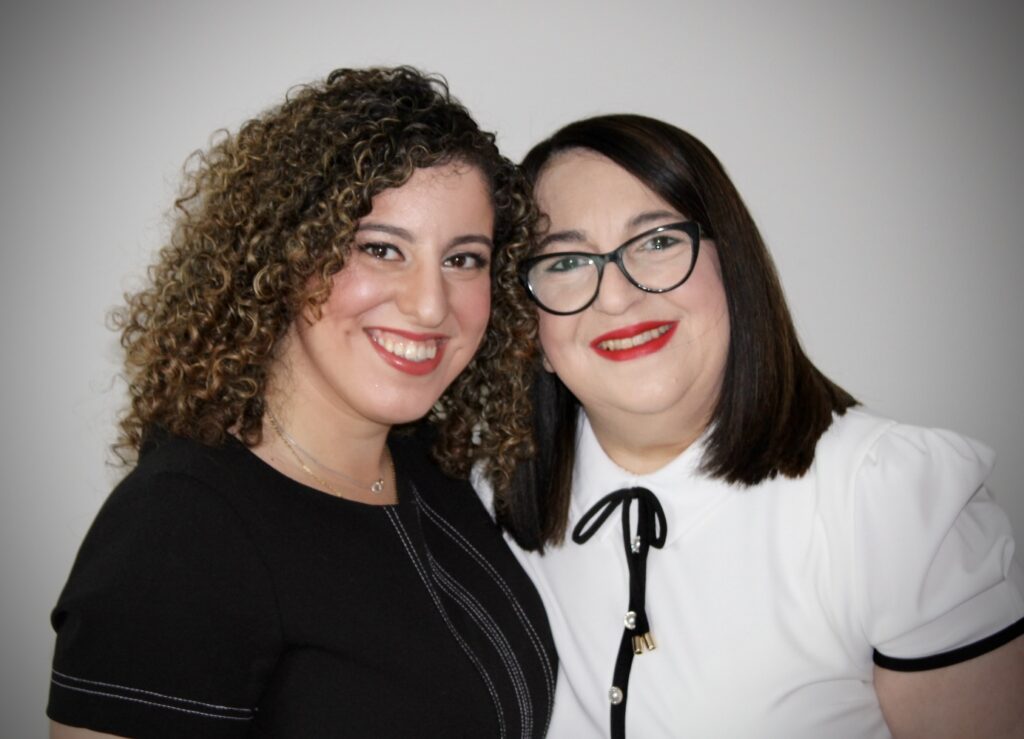On October 6, the midwives at Open Door reached a milestone by officially celebrating the birth of Noah Quito, the 10,000th baby to be delivered by an Open Door midwife since the health center opened its midwife program in September 2003. All of the babies were delivered at Phelps Hospital in Sleepy Hollow. The arrival of Noah, weighing in at 6 pounds 14 ounces over the Labor Day weekend, was celebrated during National Midwifery Week October 2 – 8, as recognized by the American College of Nurse-Midwives.
Professionals and patients agreed on the benefits of midwives. “The midwifery service at Open Door has worked collaboratively with Phelps Hospital obstetricians for many years providing outstanding obstetrical care to women in our extended community,” said Dr. Larry Mendelowitz, an obstetrician/gynecologist at Phelps Memorial Hospital. “We, at Phelps, feel very fortunate to have such an excellent, experienced and dedicated group of midwives at our institution.” “They really get to know you,” said Michelle Uzhca, Noah’s mother, an Ossining resident who also used an Open Door midwife when she gave birth to Noah’s sister, Sofia, now 3. “I didn’t know much about midwives before, but it’s really worked out well both times.” According to Lisha Coster, chief of Open Door’s midwifery program, midwives have been shown to decrease Cesarean births; reduce inductions and augmentation of labor, perineal lacerations, infant mortality and risk of preterm births; lower the amount of regional anesthesia needed; and increase the satisfaction rate with the quality of care. Midwives were also associated with higher breastfeeding rates. “We provide care that is built on a trusting and respectful relationship between the midwife and childbearing family,” said Coster. “We prioritize care that encourages a parent’s autonomy, self-determination and satisfaction, encouraging an environment that creates a sense of safety and respect for the client.”
Call the Midwife
It was a popular British export that first introduced many Americans to midwives. Conversely, many immigrants and first-generation Americans knew about the benefits of these health care professionals long before they arrived here.
“Many native-born Americans are aware of midwives and what they do because of the TV show ‘Call the Midwife,’” said Eileen Conde, a midwife at Open Door Family Medical Center, who has spent nearly three decades working as one after starting her career as a Labor and Delivery nurse. “It has made a tremendous and positive impact on the average American, capturing what it means to be a midwife – the dedication, passion, exhaustion, and emotional aspect it takes and the unexpected emergencies that arise. Meanwhile, our patients, many of whom are recent arrivals, are far more familiar with midwives and believe strongly in what we do.”
Midwifery Myths
Certain myths have sprung up around midwives. For example, they only deliver children in homes, they assist doctors – when in fact, most of their patients never see a doctor during their pregnancy or delivery, and they are interchangeable with doulas, who are not health care professionals.
The team of seven midwives at Open Door, all nurses with advanced college degrees, see patients from their first prenatal visit through their entire pregnancies – unless they were considered high risk – deliver their babies at a local hospital, and meet with them several weeks after they give birth. They strongly encourage breastfeeding, resulting in far higher rates of what maternal experts consider the healthiest option for mother and baby. They worked with patients 24/7 and cover all holidays. They met with patients at all Open Door community sites and delivered an estimated 40 births every month at Phelps, with more complicated cases transferred to high-risk care (for example, patients with diabetes or high blood pressure, or who are not seen until late in their pregnancies).
“We approach pregnancy from a normal perspective,” said Conde. “Meaning that pregnancy is normal, breastfeeding is normal. We promote the mother-baby bond, and we encourage our patients to trust and listen to their bodies.”
“Many women in the community come to us because we avoid unnecessary Cesarean births. Many have physically demanding jobs, such as housekeeping, and with a Cesarean won’t be able do heavy lifting for eight weeks. These women seek us out because they know that midwifery care is associated with a lower Cesarean rate.”
The History of Midwives
According to the magazine Midwifery Today, the licensing of midwives first occurred in the early 1700s. Since physicians were not formally educated about childbirth, midwives took on the primary responsibility.
In the early 1800s, middle-class families started using doctors for childbirth. As anesthesia became widely available in the late 1800s and early 1900s, deliveries began shifting to hospitals and midwives were only used by those who could not afford a doctor. During this time, midwives were perceived as relics of the lower class.
That changed later in the 20th century as colleges started introducing formal education for nurse midwives and the concept of family-centered maternity care grew. Still, in the New York metropolitan area, where there is a dearth of schools offering advanced midwifery degrees, there was a shortage of midwives. In fact, Open Door was one of the few health care centers and Phelps one of the only hospitals in the region to offer this service.
Conde, who grew up in a family of 10 children, says she remembered as a child seeing her mother always pregnant, which led to a fascination with pregnant women and an interest in the birth process and newborns. Midwives, she said, live by the motto “listen to women.” They offer patients a whole different perspective in the birth process that, at times, can be life changing.
As an example, she remembers treating a patient who confided in her during her 28th week of pregnancy that something didn’t feel right.
“She told me that the baby wasn’t acting normally, wasn’t moving right,” said Conde. “Usually, a concern of decreased movement that early in the pregnancy is not taken seriously, but because I knew the patient, I listened to her. Checking the baby’s heartbeat, I heard subtle indications that she was in trouble. We continued to monitor the baby until we realized the mother was correct and did an emergency Cesarean to get the baby out before it would have otherwise died.
“Several months later, the woman made a special visit to see me. She wanted to thank me in person for saving her baby’s life.”




